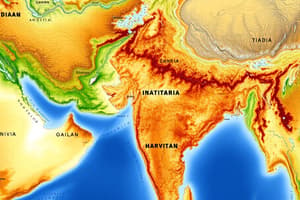Podcast
Questions and Answers
What factor has shaped global commerce and cultural exchange?
What factor has shaped global commerce and cultural exchange?
- Urbanization
- Agriculture
- Social organization
- Economic systems (correct)
Which of the following is a key component that shapes food production globally?
Which of the following is a key component that shapes food production globally?
- Industrialization
- Economic systems
- Urbanization
- Agriculture (correct)
Which of the following factors influences community dynamics and international relations?
Which of the following factors influences community dynamics and international relations?
- Agriculture
- Urbanization
- Social organization (correct)
- Economic systems
What does studying the geography of countries aid in?
What does studying the geography of countries aid in?
Which of the following factors determines a country's unique combination of physical and cultural geography?
Which of the following factors determines a country's unique combination of physical and cultural geography?
What is the primary focus of physical geography?
What is the primary focus of physical geography?
Which of the following is NOT considered a key physical feature in geography?
Which of the following is NOT considered a key physical feature in geography?
How do mountains impact the surrounding landscape?
How do mountains impact the surrounding landscape?
What is the primary role of water bodies in geography?
What is the primary role of water bodies in geography?
Which of the following factors does NOT influence climate patterns in a region?
Which of the following factors does NOT influence climate patterns in a region?
Flashcards are hidden until you start studying
Study Notes
Geography of Countries
Overview of Geography
Geography is the scientific study of landscapes, environments, and human populations. It examines both the natural and artificial features of the Earth's surface, including physical features such as mountains, bodies of water, and soil composition, as well as human-made structures like cities and roads. Geography aims to understand the locations and distribution of various phenomena on Earth, such as population density, climate patterns, and natural resources.
Physical Features
Physical geography focuses on the natural setting and earth's physical processes, including topography, climatic patterns, and land cover. Some key physical features include:
- Mountains: Highest points on Earth, such as Mount Everest, impact weather patterns and shape surrounding landscapes.
- Water bodies: Oceans, seas, lakes, and rivers are crucial for life and play a significant role in global temperature regulation.
- Climate: Temperature, precipitation, humidity, and atmospheric pressure, influenced by latitude, altitude, and proximity to bodies of water, determine the suitability of land for agriculture, wildlife habitats, and human settlements.
- Soil: Composition of soil varies across the world and affects agricultural productivity and ecosystem stability.
Cultural Landscapes
Human geography investigates the human impact on the environment and how societies organize themselves in relation to the natural environment. Key components include:
- Urbanization: The concentration of people in cities creates distinct regional cultures, economies, and social norms.
- Agriculture: Different farming techniques and crop varieties adapt to local climate and terrain, shaping food production globally.
- Economic systems: Trade relationships, such as those established by the Silk Road, have shaped global commerce and cultural exchange.
- Social organization: Population distribution, ethnic demographics, and religious groups influence community dynamics and international relations.
Countries and Their Geography
Each country exhibits unique combinations of physical and cultural geography, largely determined by its location, climate, and historical context. Understanding the geography of countries provides insights into their diverse societal structures, economic systems, and environmental challenges. Studying the geography of countries can aid in the analysis of global trends and help predict future developments.
Studying That Suits You
Use AI to generate personalized quizzes and flashcards to suit your learning preferences.




